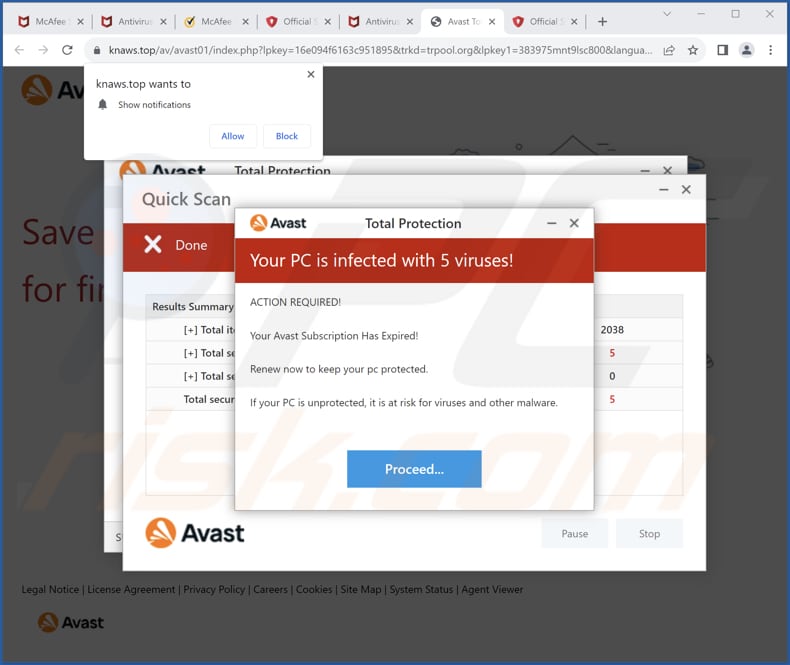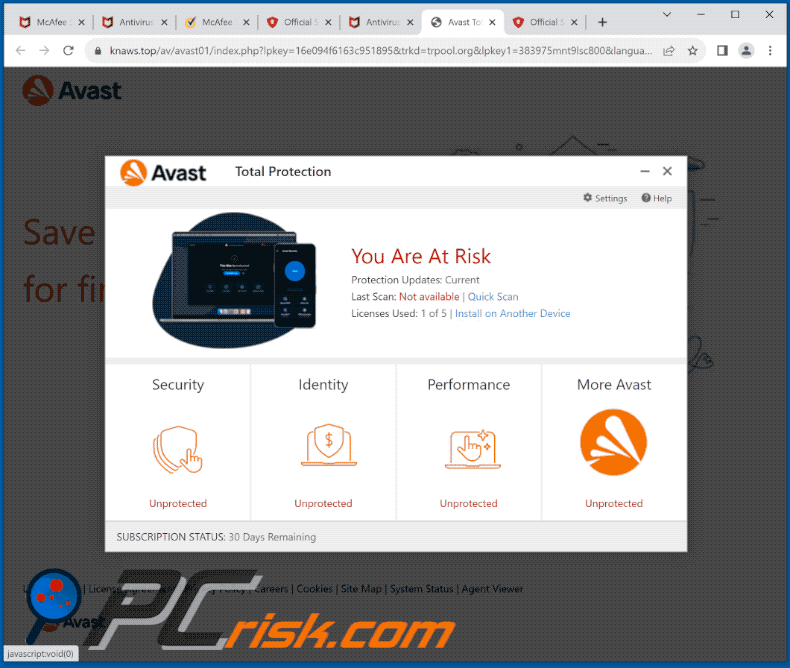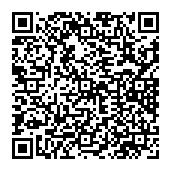How to spot deceptive pages running scams like "Avast - Your PC Is Infected With 5 Viruses!"
![]() Written by Tomas Meskauskas on
Written by Tomas Meskauskas on
What is "Avast - Your PC Is Infected With 5 Viruses!"?
During our examination of this webpage, we identified its use of deceptive messages designed to deceive visitors into thinking that their computers are infected. It is essential to avoid such websites, as they are crafted with the intent to either extort money, gather personal information, or for other malicious objectives. Usually, users stumble upon these websites inadvertently.

"Avast - Your PC Is Infected With 5 Viruses!" pop-up scam in detail
This deceptive website displays a message impersonating Avast, claiming in the third person that the user's PC is infected with five viruses. It asserts that immediate action is required because the Avast subscription has supposedly expired. The message urges the user to renew the subscription promptly to maintain PC protection, warning that an unprotected PC is vulnerable to viruses and other malware.
The misleading webpage seems to function as a space for affiliates to endorse legitimate software (Avast antivirus). Nevertheless, the affiliation between the deceptive webpage and Avast may lack authenticity, potentially leading users into a situation where they inadvertently pay for unnecessary service or service that may not deliver the expected level of security.
In any case, it is highly advisable not to place trust in websites that assert your computer is infected, and it is essential to close such sites upon visiting them. These websites often pose significant risks, as they can serve as conduits for distributing malicious software or other unwanted software.
Additionally, they may have malicious intent, aiming to pilfer financial resources or sensitive information, such as credit card details and passwords, which underscores the critical importance of exercising caution and taking swift action to exit them.
| Name | Avast - Your PC Is Infected With 5 Viruses! scam |
| Threat Type | Phishing, Scam, Social Engineering, Fraud |
| Fake Claim | A computer has been infected ant Avast antivirus subscription has expired |
| Disguise | Notification from Avast antivirus |
| Related Domains | knaws[.]top, avprotectionplus[.]com |
| Detection Names (knaws[.]top) | N/A (VirusTotal) |
| Detection Names (avprotectionplus[.]com) | N/A (VirusTotal) |
| Symptoms | Fake error messages, fake system warnings, pop-up errors, hoax computer scan. |
| Distribution methods | Compromised websites, rogue online pop-up ads, potentially unwanted applications. |
| Damage | Loss of sensitive private information, monetary loss, identity theft, possible malware infections. |
| Malware Removal (Windows) | To eliminate possible malware infections, scan your computer with legitimate antivirus software. Our security researchers recommend using Combo Cleaner. |
Similar scams in general
Deceptive webpages that host pop-up scams are carefully crafted to manipulate users by presenting false information or encouraging actions that are not in the users' best interest. These pages frequently adopt the appearance of authentic websites or reputable services, employing tactics such as persuasive messages, urgent demands for action, and, in some cases, mimicking trusted brands or well-known products.
Their goal is to take advantage of users' trust and push them into making impulsive choices, such as buying products, divulging personal information, or downloading software. These actions can result in financial losses, breaches of privacy, or infections by malicious software, underscoring the potential risks associated with falling for their deceptive tactics.
Examples of similar scams are "AVG Security POP-UP Scam", "Total AV Security - Your Smartphone Is Infected POP-UP Scam", and "Your AVAST AntiVirus License Has Expired! POP-UP Scam".
How did I open a scam website
Users may inadvertently land on fraudulent websites when engaging with malicious ads or pop-ups that redirect them to these sites or through notifications from untrustworthy sources. Phishing emails are another avenue through which users can be directed to these deceptive websites, as they often contain links designed to mislead users into clicking on them.
Moreover, adware can act as a vehicle for promoting scams, exposing users to potential fraudulent schemes. In other cases, users may encounter scam websites when they navigate to web pages affiliated with rogue advertising networks. These networks are frequently employed by movie streaming websites, torrent platforms, adult content sites, and similar types of pages.
How to avoid visiting scam pages?
Be cautious and skeptical of websites that have too many pop-up ads or notifications. Avoid clicking on enticing offers or links that appear in pop-up windows. Stick to well-known and trusted websites when searching for information or making online transactions. Install a reliable ad blocker or pop-up blocker extension on your web browser.
Do not allow suspicious sites to deliver notifications. Avoid visiting torrent sites and similar pages. Keep your computer's antivirus and anti-malware software up to date to help detect and prevent access to fraudulent websites. If your computer is already infected with unwanted apps, we recommend running a scan with Combo Cleaner Antivirus for Windows to automatically eliminate them.
The appearance of "Avast - Your PC Is Infected With 5 Viruses!" pop-up scam (GIF):

Text in a deceptive message:
Avast
Your PC is infected with 5 viruses!
ACTION REQUIRED!
Your Avast Subscription Has Expired!
Renew now to keep your pc protected.
If your PC is unprotected, it is at risk for viruses and other malware.
[Proceed...]
Instant automatic malware removal:
Manual threat removal might be a lengthy and complicated process that requires advanced IT skills. Combo Cleaner is a professional automatic malware removal tool that is recommended to get rid of malware. Download it by clicking the button below:
▼ DOWNLOAD Combo Cleaner
By downloading any software listed on this website you agree to our Privacy Policy and Terms of Use. To use full-featured product, you have to purchase a license for Combo Cleaner. 7 days free trial available. Combo Cleaner is owned and operated by Rcs Lt, the parent company of PCRisk.com read more.
Quick menu:
- What is Avast - Your PC Is Infected With 5 Viruses! scam?
- How to identify a pop-up scam?
- How do pop-up scams work?
- How to remove fake pop-ups?
- How to prevent fake pop-ups?
- What to do if you fell for a pop-up scam?
How to identify a pop-up scam?
Pop-up windows with various fake messages are a common type of lures cybercriminals use. They collect sensitive personal data, trick Internet users into calling fake tech support numbers, subscribe to useless online services, invest in shady cryptocurrency schemes, etc.
While in the majority of cases these pop-ups don't infect users' devices with malware, they can cause direct monetary loss or could result in identity theft.
Cybercriminals strive to create their rogue pop-up windows to look trustworthy, however, scams typically have the following characteristics:
- Spelling mistakes and non-professional images - Closely inspect the information displayed in a pop-up. Spelling mistakes and unprofessional images could be a sign of a scam.
- Sense of urgency - Countdown timer with a couple of minutes on it, asking you to enter your personal information or subscribe to some online service.
- Statements that you won something - If you haven't participated in a lottery, online competition, etc., and you see a pop-up window stating that you won.
- Computer or mobile device scan - A pop-up window that scans your device and informs of detected issues - is undoubtedly a scam; webpages cannot perform such actions.
- Exclusivity - Pop-up windows stating that only you are given secret access to a financial scheme that can quickly make you rich.
Example of a pop-up scam:

How do pop-up scams work?
Cybercriminals and deceptive marketers usually use various advertising networks, search engine poisoning techniques, and shady websites to generate traffic to their pop-ups. Users land on their online lures after clicking on fake download buttons, using a torrent website, or simply clicking on an Internet search engine result.
Based on users' location and device information, they are presented with a scam pop-up. Lures presented in such pop-ups range from get-rich-quick schemes to fake virus scans.
How to remove fake pop-ups?
In most cases, pop-up scams do not infect users' devices with malware. If you encountered a scam pop-up, simply closing it should be enough. In some cases scam, pop-ups may be hard to close; in such cases - close your Internet browser and restart it.
In extremely rare cases, you might need to reset your Internet browser. For this, use our instructions explaining how to reset Internet browser settings.
How to prevent fake pop-ups?
To prevent seeing pop-up scams, you should visit only reputable websites. Torrent, Crack, free online movie streaming, YouTube video download, and other websites of similar reputation commonly redirect Internet users to pop-up scams.
To minimize the risk of encountering pop-up scams, you should keep your Internet browsers up-to-date and use reputable anti-malware application. For this purpose, we recommend Combo Cleaner Antivirus for Windows.
What to do if you fell for a pop-up scam?
This depends on the type of scam that you fell for. Most commonly, pop-up scams try to trick users into sending money, giving away personal information, or giving access to one's device.
- If you sent money to scammers: You should contact your financial institution and explain that you were scammed. If informed promptly, there's a chance to get your money back.
- If you gave away your personal information: You should change your passwords and enable two-factor authentication in all online services that you use. Visit Federal Trade Commission to report identity theft and get personalized recovery steps.
- If you let scammers connect to your device: You should scan your computer with reputable anti-malware (we recommend Combo Cleaner Antivirus for Windows) - cyber criminals could have planted trojans, keyloggers, and other malware, don't use your computer until removing possible threats.
- Help other Internet users: report Internet scams to Federal Trade Commission.
Frequently Asked Questions (FAQ)
What is a pop-up scam?
A pop-up scam involves the deceitful deployment of sudden pop-up messages, frequently asserting that a computer has been infected with malware or is encountering problems. Fraudsters employ these scams to deceive users into carrying out particular tasks.
What is the purpose of a pop-up scam?
Scammers have the intention of deceiving users into dialing the provided phone number, making payments for bogus or unnecessary services, clicking on malicious links, providing remote access to computers, etc. Also, they can participate in legitimate affiliate programs to earn illegitimate commissions.
Why do I encounter fake pop-ups?
Pop-up scams come into view for users when questionable applications are installed on their computers or when they visit websites that use unreliable advertising networks, like illicit movie streaming platforms or torrent sites. Moreover, these scams can also be promoted through notifications originating from untrustworthy websites.
Will Combo Cleaner protect me from pop-up scams?
Combo Cleaner has the capability to conduct a comprehensive scan of the websites you browse. It can identify websites that intend to display pop-up scams and other shady pages. When you visit such a site, Combo Cleaner will issue a warning and limit access to safeguard you from falling victim to scams or other threats.


▼ Show Discussion